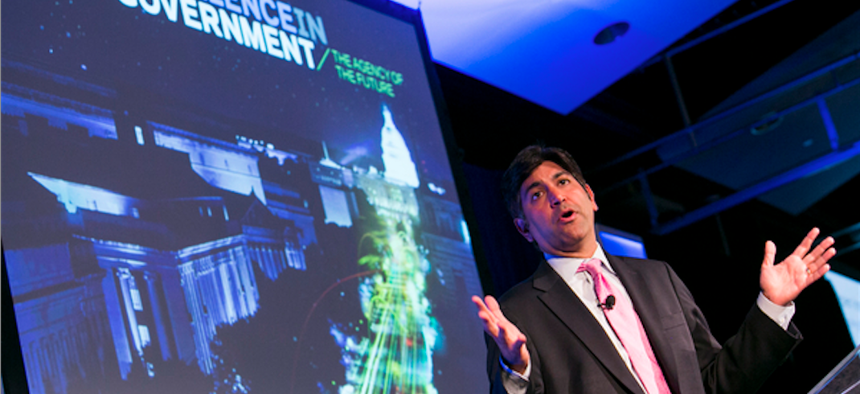
Former U.S. CTO Aneesh Chopra speaking at EIG 2014 Photo by Kristoffer Tripplaar
Open Data at Core of New Governance Paradigm
Former U.S. CTO Aneesh Chopra lays out his blueprint for a more open, innovative government. The key, he suggests, lies with each and every government employee.
Rarely are federal agencies compared favorably with Facebook, Instagram, or other modern models of innovation, but there is every reason to believe they can harness innovation to improve mission effectiveness. After all, Aneesh Chopra, former U.S. Chief Technology Officer, reminded the Excellence in Government 2014 audience that government has a long history of innovation. From nuclear fusion to the Internet, the federal government has been at the forefront of technological development.
According to Chopra, the key to fueling innovation and economic prosperity today is open data. But to make the most of open data, government needs to adapt its culture. Chopra outlined three essential elements of doing so:
- Involve external experts - integrating outside ideas is second to none as a source of innovation.
- Leverage the experience of those on the front lines - federal employees who directly execute their agency’s mission often have the best sense of what does and does not work, and what can be done to improve effectiveness.
- Look to the public as a value multiplier - just as Facebook provides a platform for tens of thousands of developers to provide greater value, federal agencies can provide the raw material for many more to generate better citizen services.
In addition to these three broad elements, Chopra offered four specific levers government can use to help enact this paradigm shift:
- Democratize government data - opening government data to the public facilitates innovation. For example, data provided by the National Oceanic and Atmospheric Administration helps generate a 5 billion dollar industry by maintaining almost no intellectual property constraints on its weather data.
- Collaborate on technical standards - government can act as a convener of industry members to standardize technological development, and thereby increase the value of data shared.
- Issue challenges and prizes - incentivizing the public to get involved and participate in efforts to create value from government data enhances the government’s ability to serve the public.
- Launch government startups - programs like the Presidential Innovation Fellows initiative helps challenge rigid bureaucratic structures and permeate a culture of innovation.
Federal leaders will need a strong political platform to sustain this shift. Fortunately, this blueprint is also bipartisan, says Chopra. Political leaders on both sides of the aisle are already getting behind the movement to bring innovation to the core of government.
For more from 2014 Excellence in Government, check out GBC’s EIG2014 recap series.
This post is written by Government Business Council; it is not written by and does not necessarily reflect the views of Government Executive Media Group's editorial staff. For more information, see our advertising guidelines.



